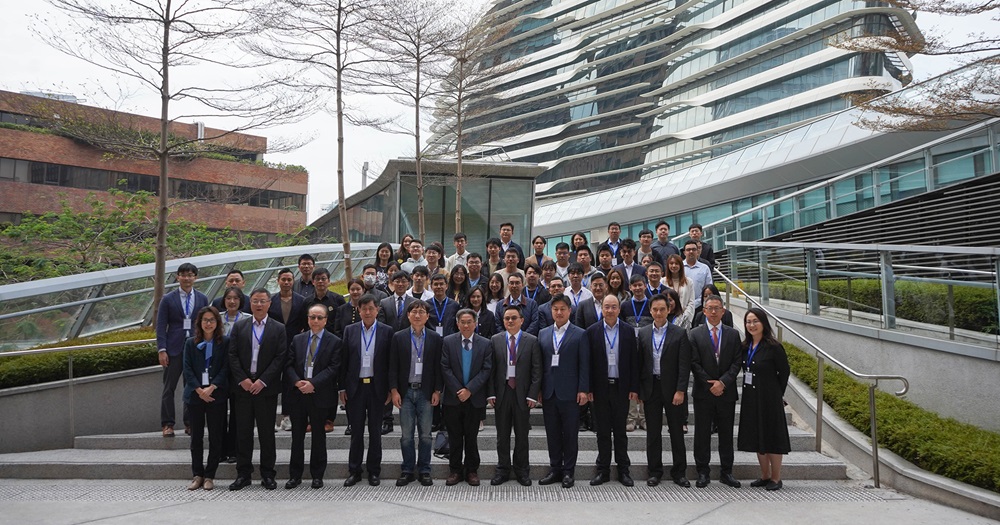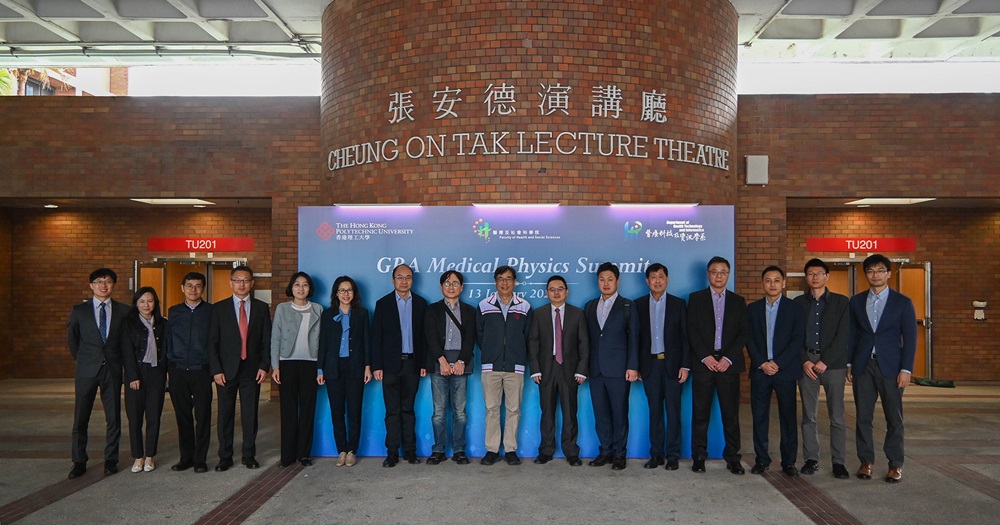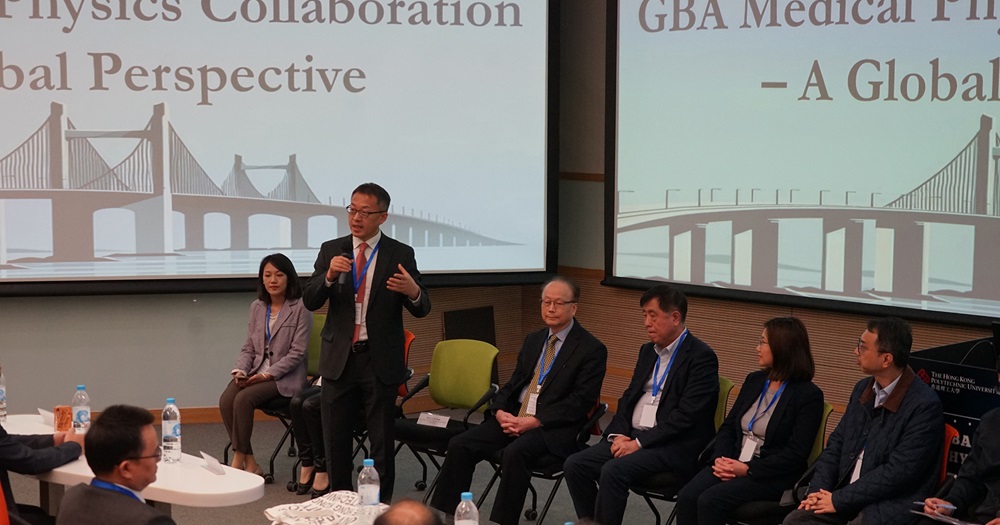The Greater Bay Area Medical Physics Summit, organised by PolyU’s Department of Health Technology and Informatics (HTI) of the Faculty of Health and Social Sciences (FHSS) successfully took place on 13 January 2024 at the PolyU campus. The event welcomed over 110 attendees, including medical physics professionals, educators, researchers, and students. The field of medical physics in the Greater Bay Area (GBA) has experienced significant growth in recent years, particularly in the radiotherapy and diagnostic imaging sectors. This summit served as a valuable platform for key stakeholders in medical physics from various GBA regions (Hong Kong, Macau, Shenzhen, Guangzhou, Zhuhai), as well as Beijing and South Korea, to engage in knowledge sharing and discuss the current state and future prospects of medical physics. The event paved the way for collaboration in both education and clinical practice.
The summit commenced with opening remarks by Prof. David SHUM, Dean of FHSS, and Prof. YIP Shea-ping, Head of HTI. They were joined by esteemed leaders from local medical physics professional organisations, including Dr CHEUNG Kin Yin, Chairman of the Hong Kong Institution of Physicists in Medicine (HKIPM) and Dr Michael LEE, Vice President of the Hong Kong Association of Medical Physicists (HKAMP). The agenda then proceeded with presentations on medical physics programmes offered by prominent universities in Hong Kong, Macau, and South Korea, as well as the latest advancements in clinical practice and technologies in GBA hospitals. Distinguished medical physics educators from two esteemed Korean universities, Prof. Sung-Joon YE of Seoul National University and Prof. Chul Hee MIN of Yonsei University emphasised the importance of international accreditation for medical physics education. Prof. Greta MOK from University of Macau provided an overview of medical physics training in Macau and highlighted advancements in radionuclide therapy. Dr Jung Sun YOO, the programme leader of the MSc in Medical Physics at PolyU, presented the steady growth of PolyU’s programme, which was launched in 2020 as Hong Kong’s inaugural postgraduate programme dedicated to medical physics.
Attendees at the summit gained valuable knowledge from Prof. DAI Jianrong, a former President of the Chinese Society of Medical Physics (CSMP), who shared insights into the developmental milestones of medical physics in Mainland China. Prof. HUANG Xiaoyan provided a comprehensive overview of the long-standing history of the medical physics programme at Sun Yat-sen University Cancer Center. The audience was particularly intrigued by the presentations highlighting recent large-scale new developments in medical physics education and clinical systems within the GBA. Prof. LI Zuofeng from Guangzhou Concord Cancer Centre, Dr WEI Xiaping from Jinshazhou Hospital of Guangzhou University of Chinese Medicine, Dr QUAN Enzhuo from Cancer Hospital Chinese Academy of Medical Sciences, Shenzhen Centre, and Dr FU Qibin from Sun Yat-sen University Institut Franco-Chinois de l'Energie Nucléaire, shared their expertise, leaving a lasting impression on the audience. The summit also featured insights into the local medical physics career pathway, with Dr Francis LEE, President of HKAMP and a medical physicist at Queen Elizabeth Hospital, alongside Dr Dennis NGAR from Tuen Mun Hospital, and Dr YANG Bin from Hong Kong Sanatorium & Hospital, providing valuable information on this topic.
The summit concluded with a comprehensive panel discussion on promoting collaboration among professionals and educators in the GBA. Prof. WANG Yang, Vice President of Jinshazhou Hospital of Guangzhou University of Chinese Medicine, highlighted the importance of collaboration in addressing current challenges in medical physics, such as standardisation and legislation issues. Dr CHEUNG Kin Yin, Chairman of HKIPM emphasised the significance of frequent networking and exchange as a starting for collaboration, viewing the summit as a meaningful catalyst for fostering GBA medical physics collaboration. The panellists also shared their insights on the role of Artificial Intelligence (AI) in medical physics, expressing predominantly positive perspectives Prof. CAI Jing, Associate Dean of FHSS, stated that AI will not replace medical physics jobs but rather assist medical physicists in various tasks. Clinical medical physicists and researchers, including Ms LEI Man I from Kiang Wu Hospital in Macau, Ms Ruby HO from Union Hospital, Dr Fion CHEUNG from Gleneagles Hospital Hong Kong), and Mr Jacob CHEUNG from The Hong Kong University – Shenzhen Hospital, Dr YUAN Jing from Hong Kong Sanatorium & Hospital), and Dr XIAO Li from Tuen Mun Hospital, echoed with Prof. CAI’s viewpoint and emphasised the need for AI in the clinical field. Their proactive attitude demonstrated the readiness of medical physicists to embrace new technologies.
The GBA Medical Physics Summit, a highly significant event gathering of GBA medical physics experts in the post-pandemic era, achieved tremendous success. Esteemed speakers drew attention to the critical shortage of medical physicists in the GBA and the increasing demand for radiotherapy and diagnostic imaging due to ageing population. Recognising the vast opportunities within the rapidly expanding healthcare market and the existing challenges faced by the profession, the summit placed great emphasis on collaborative efforts to foster talent development and propel advancements in the field of medical physics.





